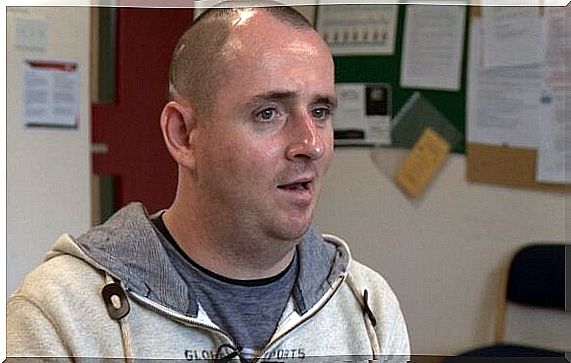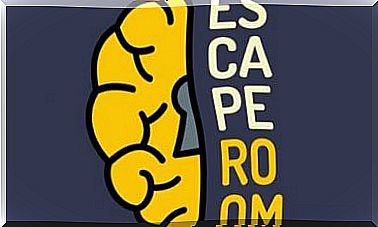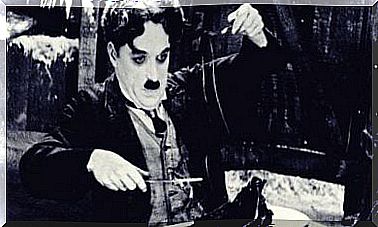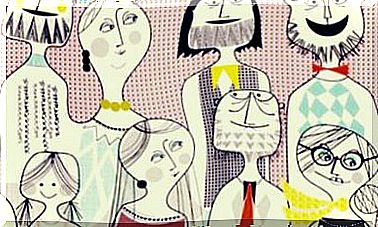Paul Pugh: A Case Of Pathological Laughter

Paul Pugh is a Welshman who was brutally attacked by strangers one day. One of the attackers hit him hard on the head. Not much later, Paul developed an uncomfortable symptom: pathological laughter, a kind of brain disorder.
Pathological laughter is laughter that you cannot comprehend and that has nothing to do with the situation in which it happens. At first this may sound funny, but it is actually a very serious condition. The condition goes by several names, the most technical of which is “gelastic epilepsy.” Some of the other names are “pseudobulbar effect” and “emotional incontinence.” The case of Paul Pugh popularized the term ” pathological laughter. “

The case of Paul Pugh
The case of Paul Pugh is one of the most famous cases of pathological laughter. His tragedy began one night in 2007 when he was having a drink with friends. On his way home he encountered four men who started beating on him for no reason.
The beating was so severe that they fractured his skull. Paul, who was then 27 years old, was kept in a coma for two months. He had to relearn even the most basic skills: walking, eating, talking and so on. And when it seemed like he had finally recovered from everything, something strange happened.
During a conversation with his doctors, Paul was told about the consequences of his abuse. The conversation had a terrible effect on Paul. He felt a strong urge to cry, and in his mind and heart he did. On the outside, however, he could only smile. He suffered from pathological laughter. He cried on the inside, but laughed on the outside.
At first this meant only social rejection for Paul . After a while, the doctors finally realized what was wrong with him. They called it “pseudobulbar effect” (PBA), or compulsive laughing/crying, which meant there was a disturbance in his brain.
In someone with this problem, the brain injury causes uncontrollable or involuntary fits of laughter, crying, or other emotional expressions. Paul is now years later and he has learned to control nine out of ten pathological laughter attacks.

Pathological laughter and its cause
Pathological laughter can be extremely painful for the people who have it. It often leads to isolation because they feel ashamed of their “inappropriate” behavior. Many patients report how terrible it is to feel one emotion intensely, but only be able to express another emotion that has nothing to do with it.
Pathological laughing and crying can be caused by various causes. Usually it occurs after trauma, as in the case of Paul. But there are some abnormal neurological conditions that can cause this as well.
There are cases of people with multiple sclerosis (MS) with these symptoms. There have even been cases of pathological laughter in people with Alzheimer’s disease. It seems that any condition that directly affects your brain can lead to pathological laughter.
Brain tumors are another possible cause. As far as we know, this happens because of a disconnection between the brain, the cerebellum, and the medulla oblongata. We also know that the hypothalamus plays a role in the condition.

Other types of pathological laughter
There are also known psychiatric cases of pathological laughter with various causes. This is where the generic term “emotional incontinence” applies. It has to do with the mental conditions in which emotions are expressed in an exaggerated way. The person cannot contain their laughter, tears, or other emotions. The condition is also associated with cases of dementia caused by vascular problems.
Even some types of schizophrenia can cause bouts of pathological laughter. It can also happen as a result of the use of psychoactive drugs : Marijuana use is well known to cause uncontrollable laughter in many people. Even some diseases of the autism spectrum include it as a symptom.
The saddest thing of all is that people with this problem usually have other side effects as well. According to a study by the psychology department at the University of Freiburg (Germany), more than half of people with this condition also show other symptoms. In general, they experience a decrease in IQ, among other cognitive problems.
The treatment options for pathological laughter are limited. In short, there is no cure. However, people like Paul Pugh are inspiring examples; he has managed to detect the moment just before an attack of pathological laughter. He immediately brings unpleasant images to mind, which prevents him from laughing. However, the condition continues to affect his life.









